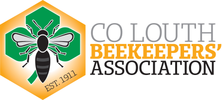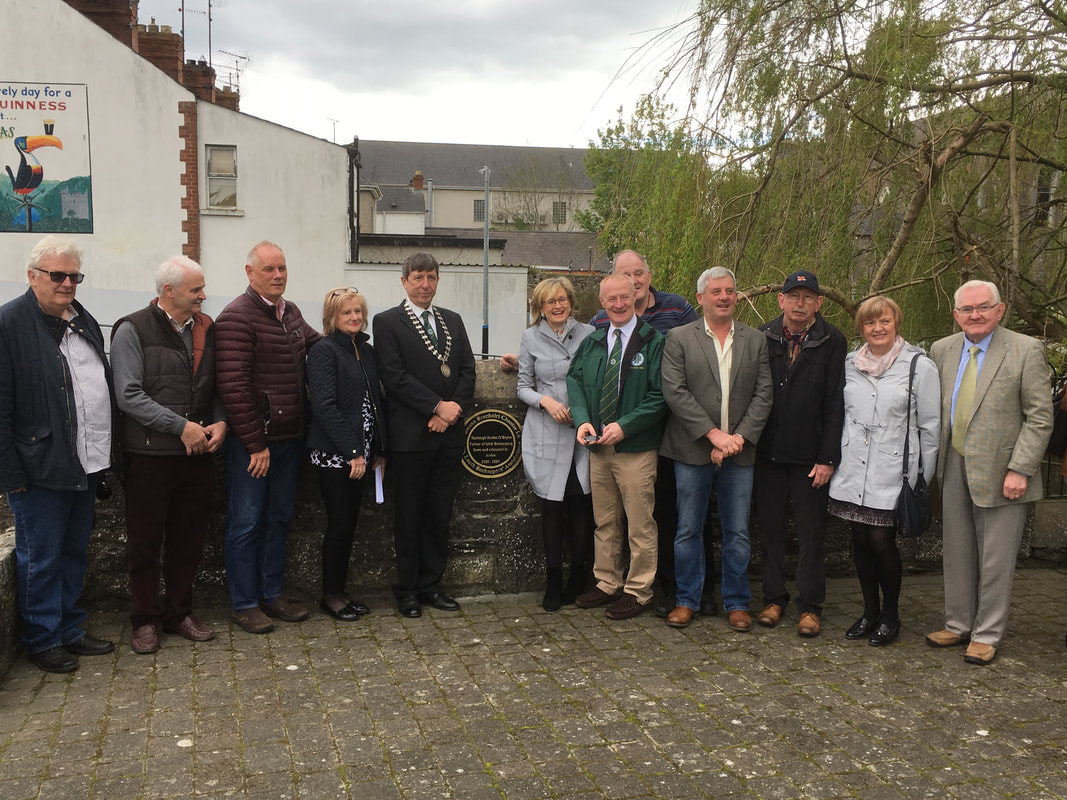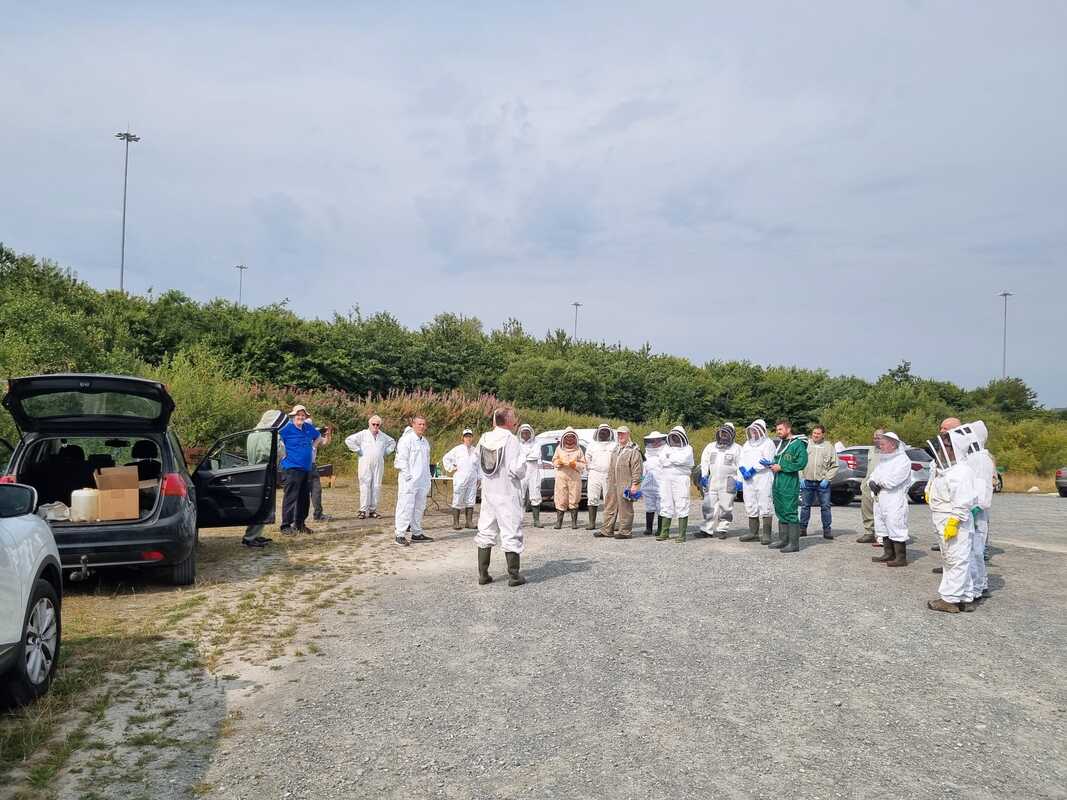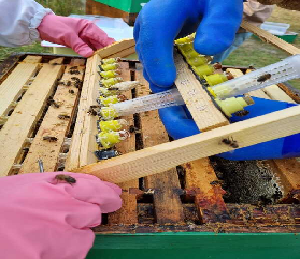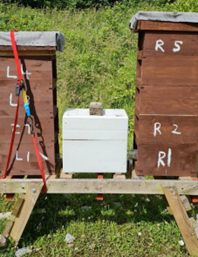All about County Louth Beekeepers' Association
County Louth has a long association with Beekeeping in Ireland. There are reports from the Middle Ages of bee towers at Clonmore and the Cistercian monastery of Mellifont, whose name actually means Fountain of Honey. Bee boles for housing skeps can also be found on old estates near Carlingford and Monasterboice. Louth Beekeeper’s Association was founded in the summer off 1910, making us one of the oldest associations in the country, and Louth is mentioned regularly in correspondence of the original Irish Beekeepers’ Association, the predecessor of FIBKA. Turlough Butler O’Brien, the famous Beeman of County Clare was born in Ardee in 1853 and went to school locally – in 2019, after several years talking about it, we eventually managed to get a plaque erected in his honour, unveiled by Paul O’Brien, FIBKA President, and attended by Mairead McGuinness.
Nowadays, we are affiliated to the national body, the Federation of Irish Beekeepers Associations (FIBKA), and our members still make the news: the late Philip McCabe, president of Apimondia, originally from Monaghan but spent many years living in Co. Louth, we have an International Honey Judge in our membership, and over the past few years various members have won numerous major prizes at the London Honey Show.
Nowadays, we are affiliated to the national body, the Federation of Irish Beekeepers Associations (FIBKA), and our members still make the news: the late Philip McCabe, president of Apimondia, originally from Monaghan but spent many years living in Co. Louth, we have an International Honey Judge in our membership, and over the past few years various members have won numerous major prizes at the London Honey Show.
Education
Our association works on behalf of member beekeepers, providing opportunities to learn the craft and science of beekeeping. The late Sr. Catherine Duffy of the Mercy Convent in Ardee was one of the pioneers driving education in the association, and this strong focus on educating our members so that they can become the best beekeepers they possibly can has continued since. Each year we run an introductory course where we explain the basics to those who are interested in taking up the craft as well as those who have recently acquired bees and are unsure how to proceed. This runs for eight weeks from February, conveniently matching the newly reorganised FIBKA education system’s introductory lectures, including its syllabus. We have embraced this new system, and currently have our first batch of students working their way through the Stage 2 Logbook. We have also run a series of study groups to help those studying for the Intermediate and Senior exams, both from our own members and members of neighbouring associations. Since these exams have now been superseded by the new education process, we will have to adjust how we help people approach this in the future.
While we teach around eighty beginners each year, our membership has remained relatively static over recent years, plateauing at around 150 members. We know we need to work on retaining these new beekeepers, including helping them so that they don’t lose heart, so hopefully future beginners will stay with us.
We have also actively participated in Science Foundation Ireland’s EDIBEE education, with a number of members actively contributing to the content. Our apiary was used as a location for one of the early sessions, with beekeepers from as far away as Mayo and Donegal coming along. Coincidentally we discovered a nuc that had AFB just before this session, so the attendees got an opportunity to see exactly what that looked like first hand. This was followed up with a day of education for our members, teaching them all about diseases and pests.
We have also actively participated in Science Foundation Ireland’s EDIBEE education, with a number of members actively contributing to the content. Our apiary was used as a location for one of the early sessions, with beekeepers from as far away as Mayo and Donegal coming along. Coincidentally we discovered a nuc that had AFB just before this session, so the attendees got an opportunity to see exactly what that looked like first hand. This was followed up with a day of education for our members, teaching them all about diseases and pests.
Monthly Meetings
Prior to COVID we held monthly meetings on the last Thursday of the month, that included a talk on a wide range of bee-related topics, Teagasc very kindly offering us the use of their large lecture room in their Dundalk office for this and other meetings. Unfortunately, COVID has meant that these meetups have been put on hold for the past couple of years, but we plan on restarting them soon. We are blessed to have many excellent beekeepers who are always willing to share their knowledge and experiences, so we want to encourage our own members to share their knowledge and experience by presenting at the meetings. Equally important, these meetups provide a social outlet for members to meet with fellow beekeepers - opportunities to share tips and tales.
We have held day trips to other locations prior to COVID and we hope to restart this practice soon. Past destinations have included trips to Galtee Bees, the Botanical Gardens, and a Queen-rearing Workshop in Dromore, and we also had visits to the apiaries of John Summerville, Keith Pierce and Michael Wilde.
We have held day trips to other locations prior to COVID and we hope to restart this practice soon. Past destinations have included trips to Galtee Bees, the Botanical Gardens, and a Queen-rearing Workshop in Dromore, and we also had visits to the apiaries of John Summerville, Keith Pierce and Michael Wilde.
Apiaries
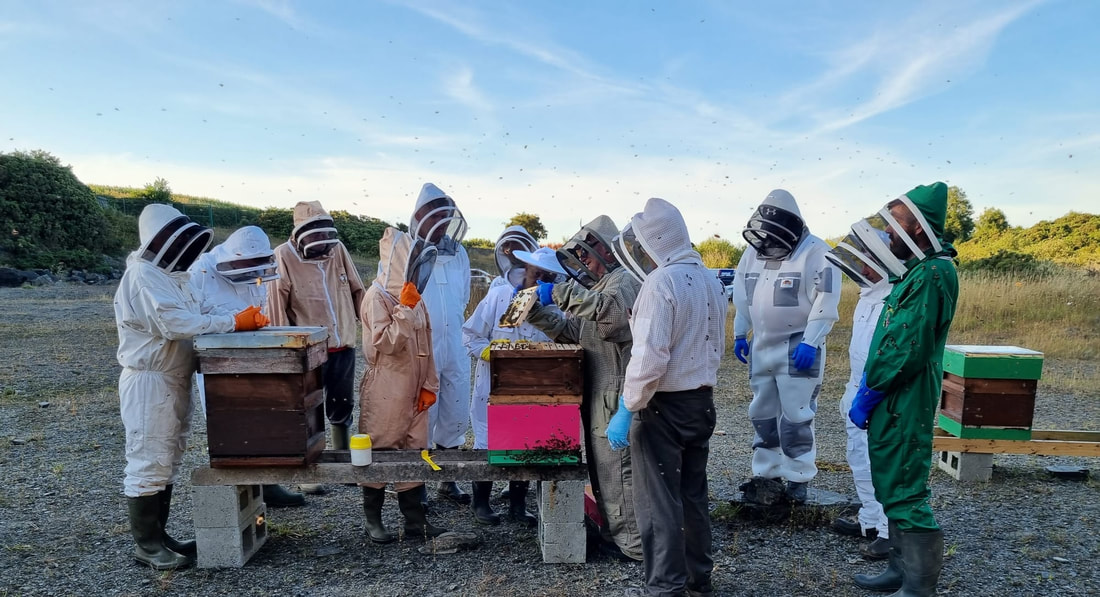 Beginners being introduced to the hive in the teaching apiary.
Beginners being introduced to the hive in the teaching apiary.
Originally, we had an association apiary in the Cooley Mts., but it was a little remote. However, in recent years a local farmer offered us space for an apiary on a piece of land that had been used during the construction of the M1 motorway. This proved ideal, with a hard surface and plenty of wild plants. Unfortunately, one of our members who had been enormously generous with his time, in particular helping beginner beekeepers, passed away, so the apiary was named the Kevin Griffin Apiary in his honour.
However, in 2022 we have managed to set up three new apiaries. In early summer Newry, Mourne and Down District Council, just across the border, provided us with a site in a disused landfill, a sheltered location surrounded by untamed wildflowers, and this has already been the subject of two BBC reports. The IDA have also kindly provided us with a location in a disused quarry, and this has now become our teaching apiary. The M1 management has given us a smaller location full of young trees, and this is ideal for our mating apiary.
We have also received a couple of hives from Pink Lady apples, adding a splash of colour to the apiary with their bright pink coat of paint.
However, in 2022 we have managed to set up three new apiaries. In early summer Newry, Mourne and Down District Council, just across the border, provided us with a site in a disused landfill, a sheltered location surrounded by untamed wildflowers, and this has already been the subject of two BBC reports. The IDA have also kindly provided us with a location in a disused quarry, and this has now become our teaching apiary. The M1 management has given us a smaller location full of young trees, and this is ideal for our mating apiary.
We have also received a couple of hives from Pink Lady apples, adding a splash of colour to the apiary with their bright pink coat of paint.
Native Irish Honey Bee
Our association is committed to supporting the native dark bee, Apis mellifera mellifera and this is reflected in our constitution, which declares Co. Louth to be a conservation area for the native Irish honey bee. The unique nature of the native honey bee population of Co. Louth and the need to conserve it was this year formally recognised by Louth Co. Council. The Kevin Griffin apiary has now become our queen-rearing apiary, with beginners’ classes moved to the new IDA apiary. Quite a few of our members have participated in the queen-rearing group that was led by NIHBS, learning techniques for raising quality queens. While we’re all getting better at this, sometimes the level of success wasn’t quite what we hoped, although each hive always delivered some queens.
While most of us focused on the basics, using Cloake Boards, Vorstman boxes, and the like, we had one spectacular queen-raising factory with twin towers that produced queens like clockwork.
In this, our second year participating, we provided a large number of mated and unmated queens to other beekeepers, and many members have now started their own queen-rearing in their home apiaries.
While most of us focused on the basics, using Cloake Boards, Vorstman boxes, and the like, we had one spectacular queen-raising factory with twin towers that produced queens like clockwork.
In this, our second year participating, we provided a large number of mated and unmated queens to other beekeepers, and many members have now started their own queen-rearing in their home apiaries.
Honey Show
We are lucky to count a Honey Judge, Paul Boyle, among our members so we have local expertise to help us learn the skills needed to produce honey, wax, etc. to the highest quality. Our annual honey show is more a learning experience than a competition, thanks to Paul’s explanations. Due to COVID, the show has been on hold for a couple of years, but this year sees its return and we hope the long absence will encourage more people to submit their entries.
What's next?
We want to provide more help and information for our members, current and future, and make sure that the beekeepers in the Wee County are supported in their beekeeping. Having members and apiaries on both sides of the border mean that we could be considered an international association and we hope to leverage that to increase awareness and education among non-beekeepers.
Proudly powered by Weebly
